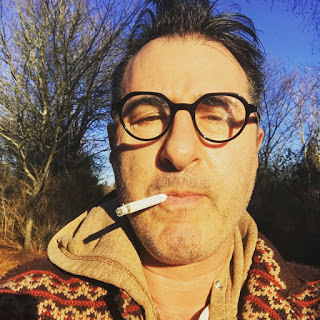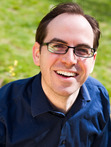I Interview Playwrights Part 975: Jon Robin Baitz

Robbie Baitz
Hometown: Los Angeles.
Current town: Los Angeles.
Somehow, after decades in New York, I have come back west again for a bit. I am equally at home in both cities, though I miss certain kinds of New York nights, fresh snow, the first cold fall days, and the museums, particularly The Neue Gallerie and Café Sabarski (a place to write), and The Met, but LA has reclaimed a kind of freedom, and young artists have decamped for its eastern parts of town, as they are so much cheaper than most of New York including the far reaches of Brooklyn. I like it here, my husband – a born and bred Manhattanite does too - young writers are living here, and its helped that TV has created opportunities for playwrights to actually give of themselves to the same extent that is required in writing a play. I mean, TV is now really ambitious. And as TV has changed, so has L.A.
Q: What are you working on now:
A: I am writing and Executive producing all of
Season Two of Ryan Murphy’s Feud, for
FX, along with my friend Ned Martel. The first season was about Joan Crawford
and Bette Davis, I was not involved, and this Feud is the one between Princess Diana and the entire Royal Family,
though principally with Prince Charles. A deeply flawed man. The scope is
somehow Shakespearian, in that the bitterness of the split between the two
dealt a kind of mortal blow to the entire institution of the British monarchy,
threatening it’s standing and its lofty altitude high above the British people,
something Diana deplored. The monarchy in many ways is a perfect construct of
conceptual art; it depends entirely on many suspensions of disbelief, on
placing importance on blood lines that go back hundreds of years. It depends on
a kind of uber-theatricality with castles and riches, vast holdings and the
dispensing of awards and favors, and any disruption in the highly ritualized
lives the royals lead, results in dark predictions that the time to do away
with the monarchy altogether is finally upon us. As a consequence, the public
nature of this feud was sort of like a public flaying for the Windsors. Diana
is such a vivid woman; compassionate, contradictory, impulsive, deeply
empathetic and generous, profoundly troubled and married when she was still a
child to a man whose ambivalence is positively Hamlet-esque. He out Hamlets Hamlet. I am lost in happiness
working on it. I love them all, they are entirely human, heart-breaking,
oblivious, even well intentioned mostly though also, of course horrible in
equal measure – they’re like everyone I know, including me.
Q: Tell me, if you will, a story from your childhood that explains who you are as a writer or as a person.
A: My family moved first to Brazil
when I was seven, and then to South Africa during apartheid in 1972 when I was
ten. I only came back to the States at eighteen. My father worked for Carnation
Milk, which later was bought by the Swiss company, Nestle. A giant
multi-national entity. An octopus. He was a vice president. I grew up realizing
the corporate, oblique, obscured, giant organization perched as it was on the
Fortune 500, was a monolith. Run by men who took pride in milk and profits and
all the other stuff they made, pet-food and ice-cream and dog toys and
expansion, always.
Q: If you could change one thing about theater, what would it be?
A: The theatre is
changing. Up at the Ojai Playwrights Conference this year, plays by women,
young people, young writers of color, more voices, not just people like me – no more plays by brittle gay playwrights
of a certain age like me - please God,
- we who said it all, we fucking said it! We need to go away. I am sort of aiming for a complete erasure of myself, so
that all is left is a ghost. The ghost of people like me.
Q: Who are or were your theatrical heroes?
A: Playwrights: Albee,
Stoppard, Churchill, Wally Shawn, David Hare and John Guare. Mr. Pinter. People
who married craft to ideas that sailed out over the stage and into the
audience, people who write from both passion and intellectual perspective, who
dispense with the obvious, whose ambitions remain constant and huge throughout
their lives, playwrights who don’t give up.
Those folks have never given up!
Q: What advice do you have for playwrights just starting out?
A: Keep your overhead low
and your ambitions impossibly high. Don’t
get an undergraduate degree in theatre, for Christ’s sake, if you must get a
degree, get one in art history or the study of leeches and macro-economics.
Anything but plays.
Also start a company with
your friends, and don’t look to the establishment to give you permission to
make plays. Fuck the gate keepers.
Embrace failure. It’s
the best way to learn. I never learn anything from the plays that work. Just
that it took a lot of work to make them work.
But failures – crash sites – they teach you so much. And sometimes the lesson is just ‘do it again
the same way but better.’
Q: When not writing on a computer, what's your go-to paper and writing utensil? When on computer, what's your font?
A: Font? Why is this even – never mind.
Courier final draft
is my font, and I like these Kaweko
sport fountain pens with blue Japanese ink, and these Japanese thin-points felt
tips called Le Pen. I buy Smithson journals of various sizes and write and draw
stupid things in them, like lists of reasons to live or a drawing of a donkey
or doodles of Donald Trump. Lists of books to read. Nine arguments against
suicide, that sort of shit.
Q: Plugs, please:
A: Up at Ojai, at the playwrights’
conference, I saw thrilling, stunning exciting new plays; J.C Lee’s What You Are, and a new play by the
mesmerizing Sam Hunter, called Greater
Clements. J.C. is a vivid, probing
and brave playwright with a voracious hunger for truth. He’s funny and dear as
well. The play deals in the end-stages of white privilege, working class
aspirations and race, all somewhere in the Central Valley of California; Didion
country. The reading of that play was terrifying, and left me exhilarated and
excited to see the piece mounted fully. Greater
Clements is about an abandoned mining town in rural Idaho, but its also is about
the same broken dreams that swirl around J.C.’s play. America is dying and
changing, evolving, killing, cannibalizing and resurrecting, a cruel place with
acts of kindness, an idealistic place whose idealism is at times simply the
reflex of a corpse. America as forest fire. Sam is serious, questioning and something holy
lives in him, a kind of grace, coupled with agonizing empathy. Another younger
playwright, Korde Tuttle was inspired by the Sandra Bland case in Texas – an
African American woman who died in police custody after a routine traffic stop,
which was anything but. The play, Graveyard
shift, has a burning poetry to it, not earthbound or polemicist but odd and
terrifying, living in a place where reality no longer contains theatrical events.
I loved these plays in particular, as well as Will Arbery’s workshop production
of Evanston Salt Costs Climbing,
which also could not be bound by naturalism and seemed to be like a long
William Carlos Williams poem set to music, even as it explored jobs being lost
and free-floating anxiety destroying people’s lives and the collective
unconscious. These are plays that all explore end-stage capitalism and the
endless mystery of being human, and one should look out for them. Really. I
don’t know where those plays will live but they will live. These are playwrights who care about who and what we are, about why we are what we
are, they are generous, and steeped in agony and yearning, I loved their work.
Finally, a plug for
myself? My own Vicuna & The American Epilogue opens at The
Mosaic Theatre in Washington DC, in early November. It is a deeply flawed play, but an attempt at
understanding ‘conditions on the ground’ in our ghoulish political era, and to
project what the end-game of all this hell is. It’s a play about how we die by
the sword of our own complicity. I still live in apartheid era South Africa and
always will, despite wanting to feel like James Coburn in a Mercedes on the PCH
in Malibu. The PCH closes frequently due to landslides and earthquakes.
It will of course end
up in the Pacific.
---------------------------------------------------------------------------------------------------------
Enter Your Email To Have New Blog Posts Sent To You
-----------------------------------------------------------------------------------------------------------
Support The Blog

-----------------------------------------------------------------------------------------------------------
Mailing list to be invited to Adam's events
Email:
------------------------------------------------------------------------------------------------------------
Adam's Patreon
Adam's New Play Exchange Profile (Plays to Read)
Books by Adam (Amazon)







Published on August 28, 2017 07:00
No comments have been added yet.



